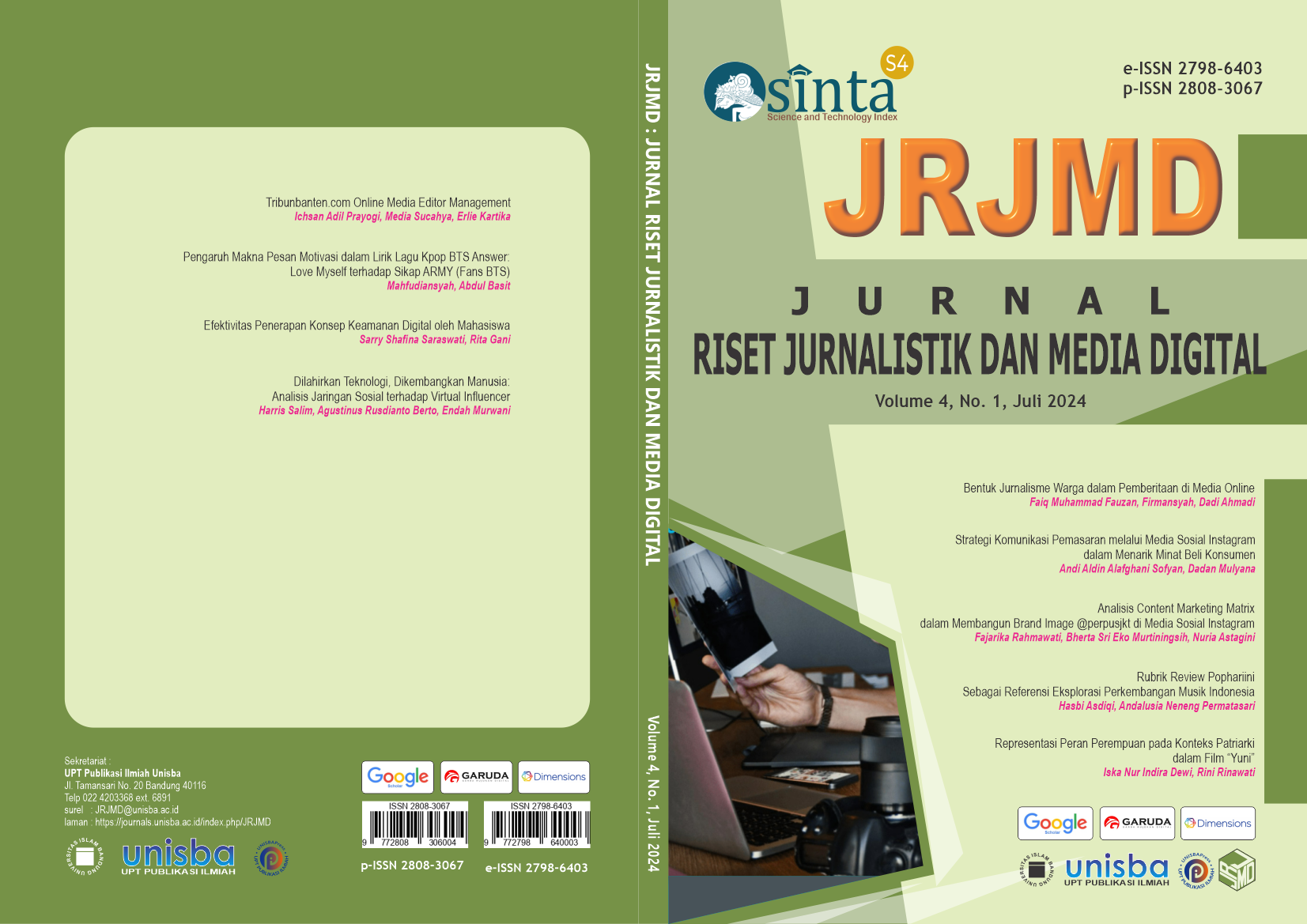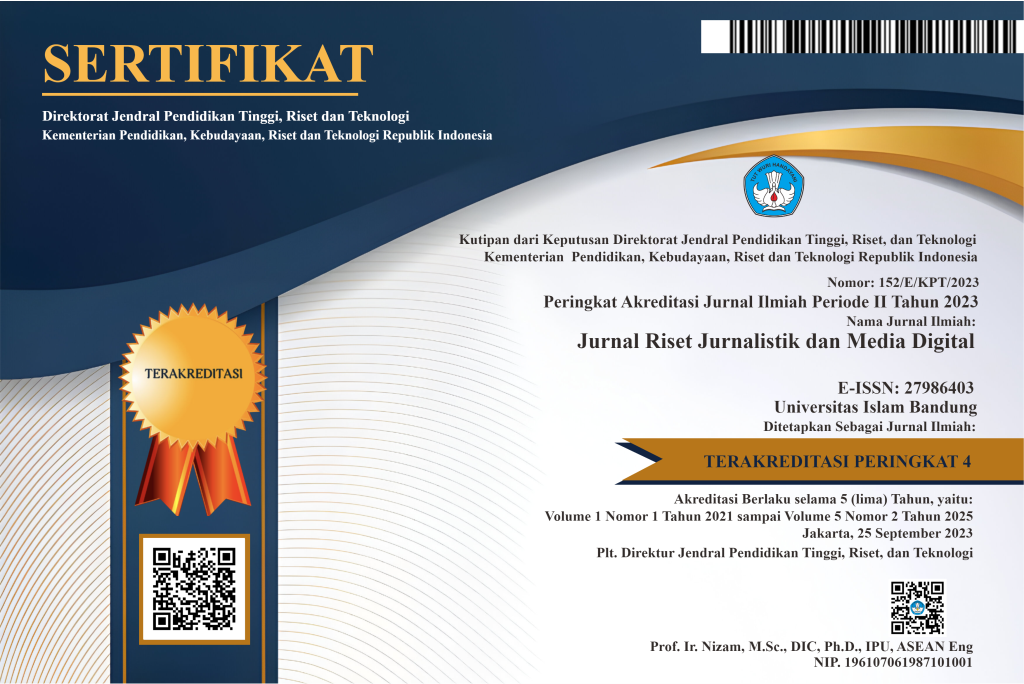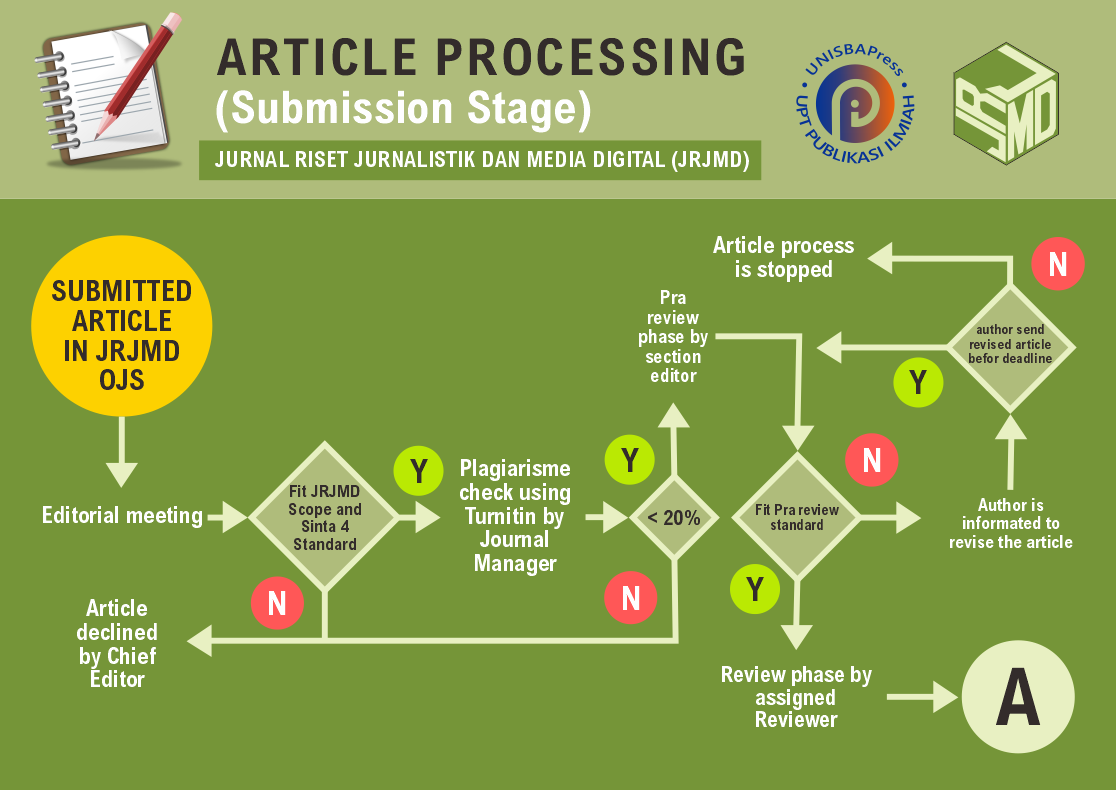Analisis Isi Pelanggaran Etika Artikel Produk Kesehatan di Apotek Online Medicastore.com
DOI:
https://doi.org/10.29313/jrjmd.v4i1.4012Keywords:
Analisis isi, etika komunikasi, Artikel Kesehatan OnlineAbstract
Abstrak. Apotek online Medicastore.com rutin menerbitkan artikel tentang kesehatan dan produk kesehatan untuk meningkatkan performa di mesin pencari, jumlah kunjungan, dan minat pembeli. Penelitian ini menganalisis artikel yang diterbitkan sepanjang tahun 2022 berdasarkan Etika Pariwara Indonesia dan Kode Etik Usaha Farmasi (KEU Farmasi) Indonesia terkait promosi digital. Hasilnya menunjukkan bahwa Medicastore patuh dalam hal tidak mengeksploitasi ketakutan, tidak menggunakan diagnosis yang tidak pasti, dan tidak membuat klaim manipulatif. Mereka juga konsisten menyediakan informasi lengkap terkait produk kesehatan. Namun, ditemukan kelemahan seperti tingginya pembuatan janji yang belum terjamin, kurangnya klaim yang sesuai dengan Kriteria Umum KEU Farmasi, kurangnya dukungan atau bantahan terhadap klaim yang dinyatakan, dan kurangnya bukti yang berbimbang.
Abstract. The online pharmacy Medicastore.com regularly publishes articles about health and health products to improve search engine performance, visitor numbers, and buyer interest. This study analyzes articles published throughout 2022 based on the Indonesian Advertising Ethics and the Indonesian Pharmaceutical Business Code of Ethics (KEU Farmasi) related to digital promotion. The results show that Medicastore complies well by not exploiting fear, not using uncertain diagnoses, and not making manipulative claims. They also consistently provide complete mandatory information regarding the health products discussed. However, there are weaknesses such as the high frequency of unguaranteed promises, the lack of claims that meet the General Criteria of the KEU Farmasi, insufficient support or rebuttals for the claims made, and a lack of weighted evidence.
References
Azizah, I. N., & Irhandayaningsih, A. (2020). Evaluasi informasi oleh mahasiswa program Studi Kedokteran Universitas Diponegoro Terhadap website informasi kesehatan. Jurnal Ilmu Perpustakaan, 8(2), 161–168.
Chang, T.-Z., & Wildt, A. R. (1994). Price, Product Information, and Purchase Intention: An Empirical Study. Journal of the Academy of Marketing Science, 22(1), 16–27. https://doi.org/10.1177/0092070394221002
Dewan Periklanan Indonesia. (2020). Etika Pariwara Indonesia: Amandemen 2020 (Edisi ke 3). Dewan Periklanan Indonesia.
Fogg, B. J. (2002, May). The Web Credibility project: Guidelines - Stanford university. A Research Summary from the Stanford Persuasive Technology Lab. Stanford University.
Gabungan Perusahaan Farmasi Indonesia. (2016). KODE ETIK USAHA FARMASI INDONESIA. Gabungan Perusahaan Farmasi Indonesia.
Idamiyarsi, L. D., Ngabur, S. N., & Widayati, A. (2022). SURVEI PENGGUNAAN INTERNET UNTUK PENCARIAN INFORMASI KESEHATAN DI KALANGAN MAHASISWA NON-KESEHATAN. Journal of Health Promotion and Service Management, 1(1), 1–10. https://doi.org/10.52232/jhpsm.v1i1.56
Idris, I. (2024, February 21). News merchants profiting from misinformation in Indonesia. Monash Lens.
Kripesh, A. S., Prabhu, H. M., & Sriram, K. V. (2020). An empirical study on the effect of product information and perceived usefulness on purchase intention during online shopping in India. International Journal of Business Innovation and Research, 21(4), 509. https://doi.org/10.1504/IJBIR.2020.105982
Lin, W.-Y., Zhang, X., Song, H., & Omori, K. (2016). Health information seeking in the Web 2.0 age: Trust in social media, uncertainty reduction, and self-disclosure. Computers in Human Behavior, 56, 289–294. https://doi.org/10.1016/j.chb.2015.11.055
Metzger, M. J., Flanagin, A. J., Mena, P., Jiang, S., & Wilson, C. (2021). From Dark to Light: The Many Shades of Sharing Misinformation Online. Media and Communication, 9(1), 134–143. https://doi.org/10.17645/mac.v9i1.3409
Nabi, R. L., & Prestin, A. (2016). Unrealistic Hope and Unnecessary Fear: Exploring How Sensationalistic News Stories Influence Health Behavior Motivation. Health Communication, 31(9), 1115–1126. https://doi.org/10.1080/10410236.2015.1045237
Neuendorf, K. A. (2017). The Content Analysis Guidebook. SAGE Publications.
Pohjanen, R. (2019). The Benefits of Search Engine Optimization in Google for Businesses.
Prabawangi, R. P., & Noer Fatanti, M. (2023). Ketika Fakta Bukanlah Kebenaran: Peran Media Daring dalam Amplifikasi Misinformasi Kesehatan di Era Pandemi Covid-19. Jurnal Komunikasi, 17(2), 185–206. https://doi.org/10.20885/komunikasi.vol17.iss2.art4
Rizkiyah, T. P. (2019). Perilaku Pencarian Informasi Kesehatan di Internet pada Masyarakat Kota Bandung. Universitas Telkom.
T, H., Sani, A., Ardhiansyah, M., & Wiliani, N. (2020). Online Shop as an interactive media information society based on search engine optimization (SEO). International Journal of Computer Trends and Technology, 68(3), 53–57. https://doi.org/10.14445/22312803/IJCTT-V68I3P110
White, R. W., & Horvitz, E. (2009). Experiences with web search on medical concerns and self diagnosis. AMIA ... Annual Symposium Proceedings. AMIA Symposium, 2009, 696–700.
Yu, Y., Liu, B. Q., Hao, J.-X., & Wang, C. (2019). Complicating or simplifying? Investigating the mixed impacts of online product information on consumers’ purchase decisions. Internet Research, 30(1), 263–287. https://doi.org/10.1108/INTR-05-2018-0247














